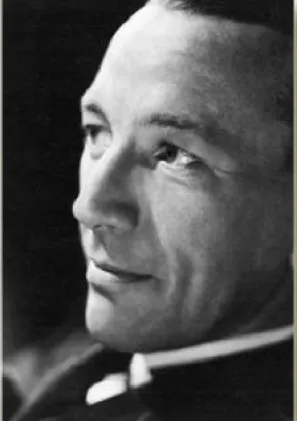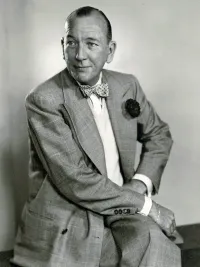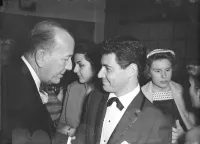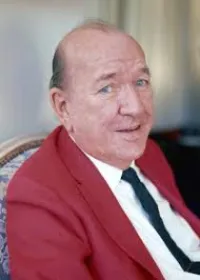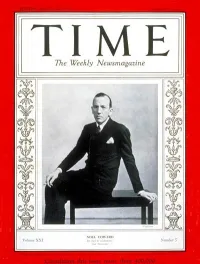Biography
1899 - 1973
“It is discouraging how many people are shocked by honesty and how few by deceit.”
– Noël Coward
It is said at least one of Noël Coward’s 27 plays is always running somewhere in the world. He helped transform theater by bringing a natural conversational style to the stage - some notable titles include ‘Private Lives’, ‘Design for Living’, and ‘Blithe Spirit.’ He was an urbane wit beyond compare and his obvious gayness meant little to his adoring fans. Coward was a phenomenon – setting a record by having three concurrent productions running in London and becoming the highest paid author in the world. He also penned revues (‘Words and Music’), operettas (‘Bitter Sweet’), musical comedies, and wrote hundreds of songs including ‘I’ll See You Again’ and ‘Mad Dogs and Englishman.’ His screenplays include ‘Brief Encounter’ and ‘In Which We Serve,’ the latter of which earned him an Oscar. An unabashed patriot, Coward – who deeply regretted that a head injury and Tuberculosis diagnosis prevented him from serving in WWI – became an undercover agent for the British government in 1938 and served throughout WWII at the behest of Winston Churchill. In the 1950s he reinvented himself as a hip cabaret singer with a tour which began in Paris and culminated in Las Vegas, made LPs, starred in several CBS TV specials, and made appearances in several films. Coward also wrote short stories, penned several memoirs as well as the novel Pomp and Circumstance. On his 70th birthday was honored with a week of revivals of his stage, screen, and TV work – which the witty Coward declared as ‘Holy Week.’ He was knighted in 1970 and the same year was given a special Tony Award. At 74 he died of a heart attack at his estate in Jamaica. As Coward once said, “My life really has been one long extravaganza.”
1899 - 1973
“It is discouraging how many people are shocked by honesty and how few by deceit.”
– Noël Coward
It is said at least one of Noël Coward’s 27 plays is always running somewhere in the world. He helped transform theater by bringing a natural conversational style to the stage - some notable titles include ‘Private Lives’, ‘Design for Living’, and ‘Blithe Spirit.’ He was an urbane wit beyond compare and his obvious gayness meant little to his adoring fans. Coward was a phenomenon – setting a record by having three concurrent productions running in London and becoming the highest paid author in the world. He also penned revues (‘Words and Music’), operettas (‘Bitter Sweet’), musical comedies, and wrote hundreds of songs including ‘I’ll See You Again’ and ‘Mad Dogs and Englishman.’ His screenplays include ‘Brief Encounter’ and ‘In Which We Serve,’ the latter of which earned him an Oscar. An unabashed patriot, Coward – who deeply regretted that a head injury and Tuberculosis diagnosis prevented him from serving in WWI – became an undercover agent for the British government in 1938 and served throughout WWII at the behest of Winston Churchill. In the 1950s he reinvented himself as a hip cabaret singer with a tour which began in Paris and culminated in Las Vegas, made LPs, starred in several CBS TV specials, and made appearances in several films. Coward also wrote short stories, penned several memoirs as well as the novel Pomp and Circumstance. On his 70th birthday was honored with a week of revivals of his stage, screen, and TV work – which the witty Coward declared as ‘Holy Week.’ He was knighted in 1970 and the same year was given a special Tony Award. At 74 he died of a heart attack at his estate in Jamaica. As Coward once said, “My life really has been one long extravaganza.”
Demography
Demography
Gender Male
Sexual Orientation Gay
Gender Identity Cisgender
Ethnicity Caucasian/White
Faith Construct Agnostic
Nations Affiliated United Kingdom France United States Switzerland Jamaica
Era/Epoch Interwar Period (1918-1939) World War II (1939-1945)
Field(s) of Contribution
Author
Film
Journalism
Music
Television
Theater
Commemorations & Honors
Time Magazine Cover (1933)
Special Academy Award For Outstanding Production Achievement For In Which We Serve (1943)
Special Tony Award For Multiple and Immortal Contributions to the Theater (1970)
Knighted By Queen Elizabeth II (1970)
Awarded Honorary Doctor of Letters Degree by the University of Sussex (1972)
Coward Statue by Angela Conner Unveiled by the Queen Mother in the Theatre Royal, Drury Lane Foyer (1998)
Albery Theatre in London Renamed the Noël Coward Theatre (2006)
Demography
Gender Male
Sexual Orientation Gay
Gender Identity Cisgender
Ethnicity Caucasian/White
Faith Construct Agnostic
Nations Affiliated United Kingdom France United States Switzerland Jamaica
Era/Epoch Interwar Period (1918-1939) World War II (1939-1945)
Field(s) of Contribution
Author
Film
Journalism
Music
Television
Theater
Commemorations & Honors
Time Magazine Cover (1933)
Special Academy Award For Outstanding Production Achievement For In Which We Serve (1943)
Special Tony Award For Multiple and Immortal Contributions to the Theater (1970)
Knighted By Queen Elizabeth II (1970)
Awarded Honorary Doctor of Letters Degree by the University of Sussex (1972)
Coward Statue by Angela Conner Unveiled by the Queen Mother in the Theatre Royal, Drury Lane Foyer (1998)
Albery Theatre in London Renamed the Noël Coward Theatre (2006)
Resources
Resources
Castle, Terry. Noël Coward and Radclyffe Hall: Kindred Spirits. New York: Columbia University Press, 1996.
Clum, John. Something for the Boys: Musical Theater and Gay Culture. New York: St. Martin's Press, 1999.
Hoare, Philip. Noël Coward: A Biography. New York: Simon & Schuster, 1995.
Lahr, John. Coward the Playwright. London: Methuen, 1982.
Lesley, Cole, Graham Payn, and Sheridan Morley. Noel Coward and His Friends. New York: William Morrow, 1979.
Mander, Raymond, and Joe Mitchenson. Theatrical Companion to Coward: A Pictorial Record of the First Performances of the Theatrical Works of Coward. New York: Macmillan, 1957.
Morley, Sheridan. A Talent to Amuse: A Biography of Noel Coward. Garden City, N. Y.: Doubleday, 1969.
Sinfield, Alan. "Private Lives/Public Theater: Noel Coward and the Politics of Homosexual Representation." Representations 36 (Fall 1991): 43-63.
https://en.wikipedia.org/wiki/No%C3%ABl_Coward
https://www.imdb.com/name/nm0002021/bio
Resources
Castle, Terry. Noël Coward and Radclyffe Hall: Kindred Spirits. New York: Columbia University Press, 1996.
Clum, John. Something for the Boys: Musical Theater and Gay Culture. New York: St. Martin's Press, 1999.
Hoare, Philip. Noël Coward: A Biography. New York: Simon & Schuster, 1995.
Lahr, John. Coward the Playwright. London: Methuen, 1982.
Lesley, Cole, Graham Payn, and Sheridan Morley. Noel Coward and His Friends. New York: William Morrow, 1979.
Mander, Raymond, and Joe Mitchenson. Theatrical Companion to Coward: A Pictorial Record of the First Performances of the Theatrical Works of Coward. New York: Macmillan, 1957.
Morley, Sheridan. A Talent to Amuse: A Biography of Noel Coward. Garden City, N. Y.: Doubleday, 1969.
Sinfield, Alan. "Private Lives/Public Theater: Noel Coward and the Politics of Homosexual Representation." Representations 36 (Fall 1991): 43-63.
https://en.wikipedia.org/wiki/No%C3%ABl_Coward
https://www.imdb.com/name/nm0002021/bio
